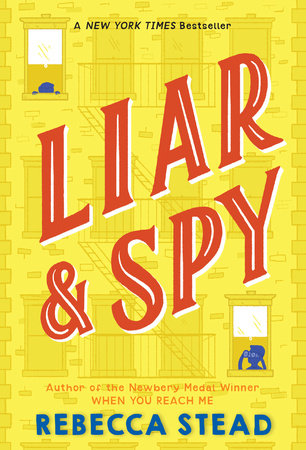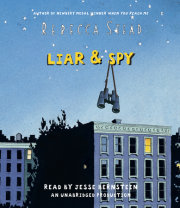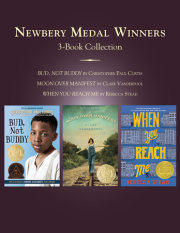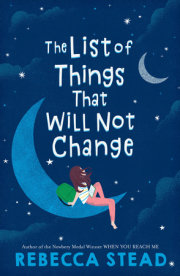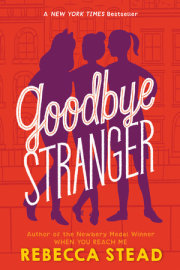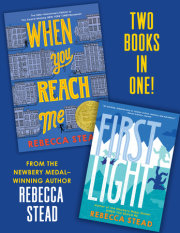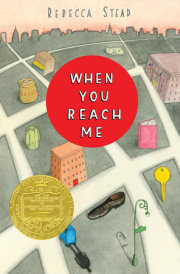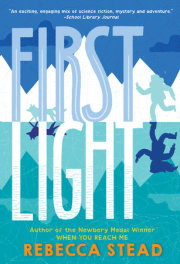The Science Unit of Destiny
There's this totally false map of the human tongue. It's supposed to show where we taste different things, like salty on the side of the tongue, sweet in the front, bitter in the back. Some guy drew it a hundred years ago, and people have been forcing kids to memorize it ever since.
But it's wrong--all wrong. As in, not even the slightest bit right. It turns out that our taste buds are all alike, they can taste everything, and they're all over the place. Mr. Landau, seventh-grade science teacher, has unrolled a beaten-up poster of the ignorant tongue map, and he's explaining about how people have misunderstood the science of taste since the beginning of time.
Everyone in my class, even Bob English Who Draws, is paying attention today, because this is the first day of "How We Taste," also known as The Science Unit of Destiny. They all believe that sometime in the next ten school days, at least one person in the room is going to discover his or her own personal fate: true love or tragic death.
Yes, those are the only two choices.
Bob English Who Draws is really named Robert English. Back in fourth grade, our teacher, Ms. Diamatis, started calling him Bob English Who Draws because he was always zoning out and doodling with a superfine Sharpie. Ms. Diamatis would say, "Bob English Who Draws, can you please take us through the eights?" It was her job to make sure no one got out of fourth grade without lightning-fast multiplication skills. And everyone has called him that ever since.
While the rest of the class is hanging on every syllable that comes out of Mr. Landau's mouth, I'm looking at the false tongue poster and I'm kind of wishing it wasn't wrong. There's something nice about those thick black arrows: sour here, salty there, like there's a right place for everything. Instead of the total confusion the human tongue actually turns out to be.
People, People
It's Friday afternoon, last period. Gym. Ms. Warner and I have done our Friday high five. We do it every week, because I hate school and she hates work, and we both live for Friday.
We're playing volleyball, with an exclamation point. Ms. Warner has written it on the whiteboard outside the gym doors: Volleyball!
The combination of seeing that word and breathing the smell of the first floor, which is the smell of the cafeteria after lunch, creates some kind of echo in my head, like a faraway shout.
In the morning, the cafeteria smells fried and sweet, like fish sticks and cookies. But after lunch, it's different. There's more kid sweat and garbage mixed in, I guess. Or maybe it's just that, after lunch, the cafeteria doesn't have the smell of things to come. It's the smell of what has been.
Volleyball!
Ms. Warner is at the net with her hands on her knees, calling stuff out to kids and smiling like crazy. "Shazam!" she yells when Eliza Donan gives the ball a halfhearted bump with her forearm. "Sweet shot!"
If you didn't know Ms. Warner, you'd think there's no place she'd rather be. Maybe she's trying out my mom's famous theory that if you smile for no reason at all you will actually start to feel happy. Mom's always telling me to smile and hoping I'll turn into a smiley person, which, to be honest, is kind of annoying. But I know she's extra-sensitive about me ever since she and Dad made their big announcement that we had to sell our house. She even recorded a bunch of America's Funniest Home Videos for me to watch: my smile therapy.
I tell Mom to please save her miracle cures for the hospital. She's a nurse in the intensive-care ward, where she has to check on her patients every fifteen minutes. It's a hard habit to break, I guess, all that checking. I've been watching the shows, though, and they do make me laugh. How can you not laugh at America's Funniest Home Videos? All those wacky animals. All that falling down.
I count the number of rotations we have left in "Volleyball!" before it's my serve and then glance at the huge clock in its protective cage on the wall. I calculate a fifty-fifty chance that the dismissal bell will save me, but the next thing I know I'm in that back corner, balancing the ball on one palm and getting ready to slap it with the other.
Don't look at the ball.
Point your eyes where you want the ball to go.
But the advice in my head is useless, because time slows down until everyone's voices transform into something that sounds like underwater whale-singing.
Well, obviously "underwater," I tell myself. Where else are you going to find whales?
I should be paying attention to the ball.
Just as I'm about to smack it, I get this feeling, this premonition, that I'm going to land the ball at least somewhere on the other side of the net, maybe even in that big hole in the second row where Mandy and Gabe are being careful not to stand too close because they secretly like each other.
I'm wrong, though. The ball goes high, falls short, and hits the floor between the feet of Dallas Llewellyn, who is standing right in front of me. My serve is what is called an epic fail, and some of the girls start doing the slow clap.
Clap.
Pause.
Clap.
Pause.
Clap.
It's sarcastic clapping. You know that famous philosophical question "What is the sound of one hand clapping?" Well, I have no idea, but it has to be better than the slow clap.
Ms. Warner is yelling "People! People!" like she always does when kids are mean and she has no idea what to do about it.
Dallas hands me the ball for my second try and I hit it right away, just to get it over with. This time it goes way left, out of bounds. Then the bell rings, kids fly in all directions, and the week is over.
Copyright © 2012 by Rebecca Stead. All rights reserved. No part of this excerpt may be reproduced or reprinted without permission in writing from the publisher.

